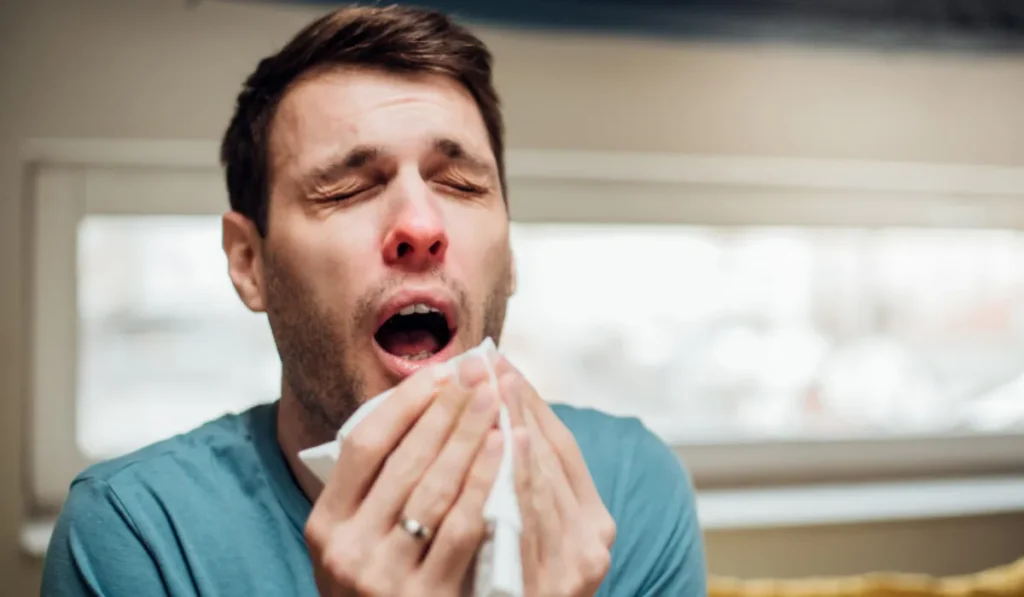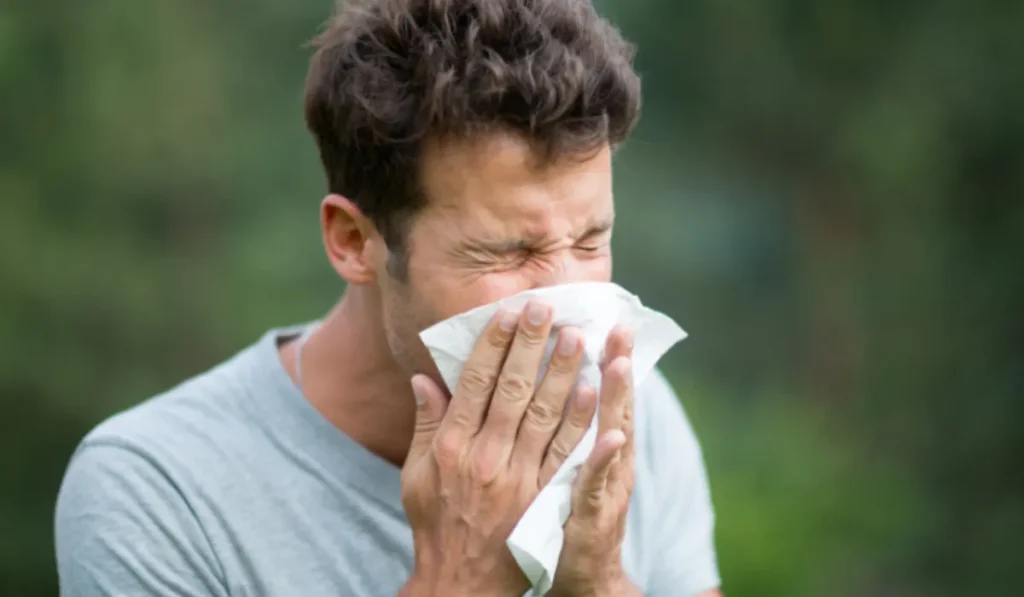Yes, mold can make you sneeze. Mold spores irritate the nasal passages, triggering allergic reactions such as sneezing. Those with mold allergies or sensitivities are especially prone to sneezing when exposed to mold.
Understanding Mold and Its Effects on Health

What Is Mold?
Mold is a type of fungus that grows in damp and humid areas. It comes in various colors like black, white, green, or orange.
Some common types include Aspergillus, Cladosporium, and Penicillium. Mold is not always dangerous, but some types can harm your health.
Common Mold Habitats in Homes
Mold loves wet places. It often grows in bathrooms, kitchens, and basements. It can hide under carpets, inside walls, or around leaky pipes.
Keeping these areas dry and well-ventilated helps prevent mold from making a home in your house.
Mold Growth and Spread
Mold spreads by releasing tiny spores into the air. These spores float around until they land on a damp spot where they can grow. They are so small you can’t see them, but they can travel all over your house.
Health Problems Caused by Mold
Breathing in mold can make some people sick. It can cause sneezing, coughing, and itchy eyes, especially if you are allergic to it.
Long-term exposure to mold can lead to more serious health issues like asthma or other lung problems.
Connection Between Mold and Sneezing

Why Mold Causes Allergies?
Mold allergies happen when your body thinks mold spores are invaders. Your immune system fights back by releasing chemicals like histamine.
This can make you sneeze, have a runny nose, or itchy eyes. It’s your body’s way of trying to get rid of the spores.
Body’s Defense Against Mold
When you breathe in mold spores, your body’s immune system kicks into action. It tries to protect you by making mucus and causing sneezes to push the spores out of your nose. This is a natural way your body keeps you healthy.
Mold Allergens That Trigger Sneezing
Some parts of mold, called allergens, are really good at making you sneeze. These allergens are like a signal to your body to start fighting.
Everyone’s body reacts differently, but for those with mold allergies, these allergens can cause a lot of sneezing.
How Common Are Mold Allergies?
Many people are allergic to mold. In fact, it’s one of the top reasons for allergies. People with asthma or other breathing problems might find that mold makes their symptoms worse. That’s why it’s important to keep mold out of homes and buildings.
Preventing and Managing Mold-Related Sneezing

Stopping Mold Before It Starts
Keep your home dry and clean to stop mold from growing. Fix leaks right away, use a dehumidifier, and open windows to let fresh air in. These steps can make it harder for mold to grow.
Best Cleaning Practices for Mold Prevention
Cleaning regularly helps prevent mold. Use mold-killing products in bathrooms and kitchens.
Also, check often for mold in hidden places like under sinks and in closets. Clean mold spots as soon as you see them, so they don’t get bigger.
Medicines and Home Remedies for Mold Allergies
If mold makes you sneeze, you might need medicine. Antihistamines can stop the sneezes and runny nose.
Nose sprays and allergy shots are other options. Some people use natural remedies like rinsing their nose with saltwater to feel better.
When to Ask for Expert Help?
If you have a lot of mold or keep getting sick, it might be time to call a professional. They know how to safely get rid of mold in your home. If your allergies are really bad, a doctor can help find the best treatment for you.
FAQs About Mold and Sneezing
Can mold exposure cause sneezing?
Yes, mold exposure can cause sneezing as mold spores irritate the nasal passages and trigger allergic reactions.
Are certain individuals more prone to sneezing from mold?
Yes, individuals with mold allergies or sensitivities are more prone to sneezing when exposed to mold.
Is sneezing the only allergic reaction to mold?
No, sneezing is just one of many possible allergic reactions to mold, which may also include coughing, itchy eyes, and runny nose.
How can I tell if my sneezing is caused by mold?
If you notice increased sneezing when in damp or moldy environments, or if you have other symptoms of mold exposure, it may be caused by mold.
Can mold-related sneezing be treated?
Yes, mold-related sneezing can be treated with antihistamines, nasal sprays, and by reducing mold exposure in your environment.
Final Thoughts
Mold has the potential to prompt sneezing due to the irritation it causes in the nasal passages.
This is particularly prevalent among individuals with allergies or sensitivities to mold, as exposure to spores triggers allergic reactions that often include sneezing among other symptoms.
